|
|
|
"SCHMID, GEORG LUDWIG.
Essais sur divers sujets interessans de politique et de morale.
(Aarau), 1760. 8vo. In a contemporary full calf binding with five raised bands and richly gilt spine. Upper left corner of front board with cratches. With notes in contemporary hand to upper part of front free end-paper. Light brownspotting to first and last leaves, otherwise a fine copy. XI, (1), 362, (2) pp.
Referentie van de boekhandelaar : 60149

|
|
|
"SCIALOJA, ANTONIO.
I Principj della Economia Sociale Esposti in Ordine Idealogico. - [LANDMARK WORK ON 19TH CENTURTY ITALIAN ECONOMICS]
Napoli, Dalla Tipografia di Gennaro Palma, 1840. 8vo. In contemporary full blue cloth with blindstamped title to spine. Remains of paper-label to to lower part of spine. Extremities with a few bumps and light soiling. Internally with light brown-spotting throughout. 379, (1) pp.
Referentie van de boekhandelaar : 50928

|
|
|
"SCACCIA, SIGISMONDO.
Tractatus de commerciis, et cambio in quo non minus opportune, quam iuxta occasionem copiose tractatur de mora, interesse, usura ... & de modo procedendi in causis cambiorum. - [INITIATING 'EXCHANGE TRANSACTIONS' IN LITERATURE]
Romae, Sumptibus A. Brugiotti, 1619. Folio. In a later half calf binding with 4 raised bands, gilt lettering and gilt ornamentation to spine. Light wear to extremities, a fine and clean copy. (8), 755, (124) pp.
Referentie van de boekhandelaar : 53755
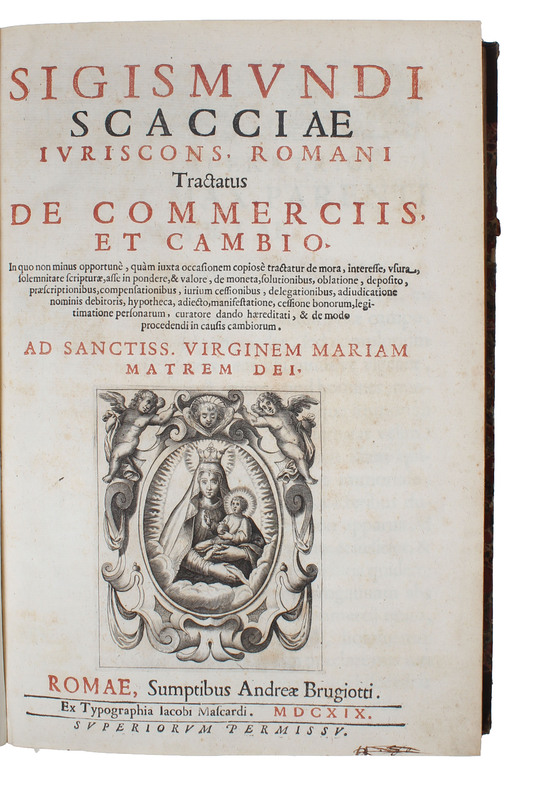
|
|
|
"SCACCIA, SIGISMONDO.
Tractatus de commerciis, et cambio in quo non minus opportune, quam iuxta occasionem copiose` tractatur de mora, interesse, usura ... & de modo procedendi in causis cambiorum. - [INITIATING 'EXCHANGE TRANSACTIONS' IN LITERATURE]
Romae, Sumptibus A. Brugiotti, 1619. Folio. In a later half calf binding with 4 raised bands, gilt lettering and gilt ornamentation to spine. Light wear to extremities, a fine and clean copy. (8), 755, (124) pp.
|
|
|
"SCHMID, GEORG LUDWIG.
Essais sur divers sujets interessans de politique et de morale.
(Aarau), 1760. 8vo. In a contemporary full calf binding with five raised bands and richly gilt spine. Upper left corner of front board with cratches. With notes in contemporary hand to upper part of front free end-paper. Light brownspotting to first and last leaves, otherwise a fine copy. XI, (1), 362, (2) pp.
|
|
|
"SCIALOJA, ANTONIO.
I Principj della Economia Sociale Esposti in Ordine Idealogico. - [LANDMARK WORK ON 19TH CENTURTY ITALIAN ECONOMICS]
Napoli, Dalla Tipografia di Gennaro Palma, 1840. 8vo. In contemporary full blue cloth with blindstamped title to spine. Remains of paper-label to to lower part of spine. Extremities with a few bumps and light soiling. Internally with light brown-spotting throughout. 379, (1) pp.
|
|
|
"Sis and Jake"
Start Your Own Home Inspection Service: Your Step-By-Step Guide to Success
Entrepreneur Pr 2003. Gd. condition - A how-to guide on starting your own business - . TK28663z. Soft Cover. Good. Entrepreneur Pr Paperback
Referentie van de boekhandelaar : 8663z ISBN : 1932156011 9781932156010

|
|
|
"SMITH, ADAM -
""Om Beskatning"" (+) ""Om Jordbrukets förfall i Europa, efter Romerska Väldets undergäng"" (+) ""Om Handelsbalancen"" (+) ""Om Jordbruks-systemet I en Rikshushållning, samt om Economisterne I Frankrike"" (+) ""Om Pappers-myntet I Norr-Amerika Kolonierne, före... - [""THE EARLIEST APPEARANCE IN SWEDISH OF A NUMBER OF TRANSLATIONS FROM ADAM SMITH""]
Stockholm, Henrik A. Nordström, 1797-1801. 8vo. Uncut, partly unopened in the original wrappers. In 22 volumes as issued. Last volume name written on title-page, otherwise an exceptionally fine, clean and untouched set rarely seen in this condition. (4),102 pp." (2),182 pp. (2),107 pp. (2),157,(1) pp. (2),176,(4) pp. (4),138,(2) pp. (2),205,(1) pp. + 1 folded table (2),188 pp (2),190 pp. (2),89,(4) pp. (4),135,(1) pp. (2),116,(1) pp. (2),157 pp. (2),120 pp. (2),151,(1 blank,10) pp. + 1 folded map (2),215 pp. + 1 folded table (2),131,(5) pp. (4),207 pp. (2),183,(1) pp. + 1 folded table (2),218 pp. (2),144,(4) pp." (6),449,(1) pp. + 5 folded plates.""Om Beskatning"", Part: 36, 37, 38:Pp. 145-177""Om Jordbrukets förfall i Europa, efter Romerska Väldets undergäng"", Part: 27, 28. Pp. 93-120""Om Handelsbalancen"", Part: 25,26. Pp. 92-114""Om Jordbruks-systemet I en Rikshushållning, samt om Economisterne I Frankrike"", Part: 25-26. Pp. 43-92""Om Pappers-myntet I Norr-Amerika Kolonierne, före Revolutionen"". Part: 27-28. Pp.57-62""Om Krono-jord"". Part: 29,30,31. Pp 139-146.""Theorien för statsskulder"". Part: 44, 45, 46, 47, 48, 49 & 50. Pp. 151-161.
Referentie van de boekhandelaar : 53615

|
|
|
"SMITH, ADAM.
En Undersökning av Folkens Välstånd dess Natur och Orsaker. Översättning av D:r Emil Sommarin. 2 volumes. - [FIRST SWEDISH EDITION OF ""THE WEALTH OF NATIONS""]
Lund, C. W. K. Gleerups förlag, 1909 & 1911. 8vo. Bound with the original wrappers of volume 1 in one contemporary half blue cloth binding with red leather titel label with gilt lettering to spine. A fine and clean copy. XVI,191, (4), 179 pp.
Referentie van de boekhandelaar : 58766
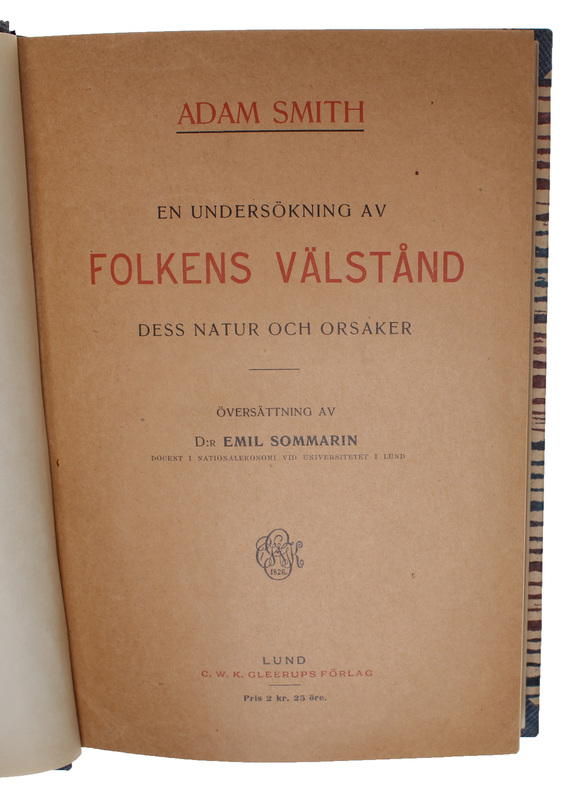
|
|
|
"SMITH, ADAM.
En Undersökning av Folkens Välstånd dess Natur och Orsaker. Översättning av D:r Emil Sommarin. [i.e. Swedish ""Wealth of Nations""]. 2 volumes. - [FIRST SWEDISH EDITION OF ""THE WEALTH OF NATIONS""]
Lund, C. W. K. Gleerups förlag, 1909 & 1911. 8vo. Both volumes in the original printed wrappers. Light wear to spines, otherwise a very fine and clean set. XVI,191, (4), 179 pp.
Referentie van de boekhandelaar : 58833

|
|
|
"SMITH, ADAM.
Milletlerin Zenginligi. [i.e. ""Wealth of Nations""] 4 vols. - [FIRST TURKISH TRANSLATION OF 'WEALTH OF NATIONS']
Istanbul, Milli Egitim Basimevi, 1948 [Vol. 1 & 2] & 1955 [Vol. 3 & 4]. 8vo. 4 volumes in the original printed wrapper. Spines (especially on vol. 1 and 4) with wear and a bit of miscolouring, otherwise a fine and clean set. IV, 393, (8)" (6), 340386" 415, (2) pp.
Referentie van de boekhandelaar : 58582
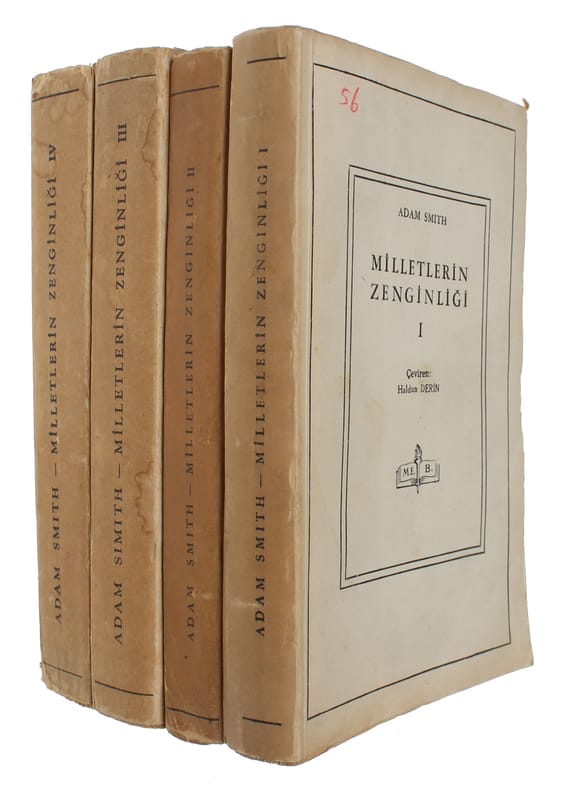
|
|
|
"SMITH, ADAM.
Politisk undersökning om lagar, som hindra och tvinga införseln af sådana utländska varor, som kunna alstras eller tillverkas inom landet. Göteborg. (i.e. English: ""An Inquiry into the Nature and Causes of the Wealth of Nations""). - [SWEDISH TRANSLATION OF ADAM SMITH'S WEALTH OF NATIONS]
Göteborg (S. Norberg) 1804. 8vo. In contemporary grey blank wrappers. Stamp to front wrapper, verso of front wrapper, title-page and p. 17. Otherwise fine. (12), (1)-51, (1) pp.
Referentie van de boekhandelaar : 58583
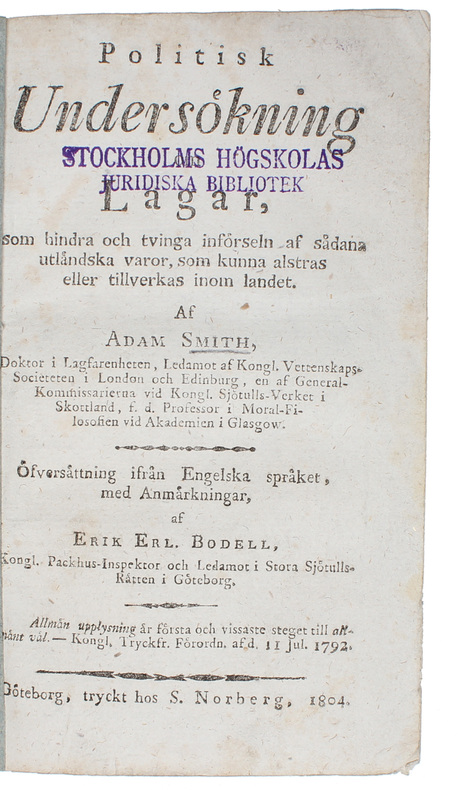
|
|
|
"SMITH, ADAM.
Teoriia nravstvennykh chuvstv [...] S pis'mami M. Kondorse k Kabanisu o simpatii. [i.e. Russian ""Theory of Moral Sentiments""]. - [FIRST RUSSIAN TRANSLATION OF ""THE THEORY OF MORAL SENTIMENTS""]
St Petersburg, I. I. Glazunov, 1868. 8vo. In contemporary half calf with with embossed boards. Three raised bands and gilt lettering to spine. Spine with wear. Small label pasted on to top left corner of pasted down front free end-paper. Removed stamp to half-title and title-page with stamp and a a few number written to top of title-page. A few light occassional underlining in pencil, otherwise internally fine and clean. (1)-515, (1), IV pp.
Referentie van de boekhandelaar : 56148
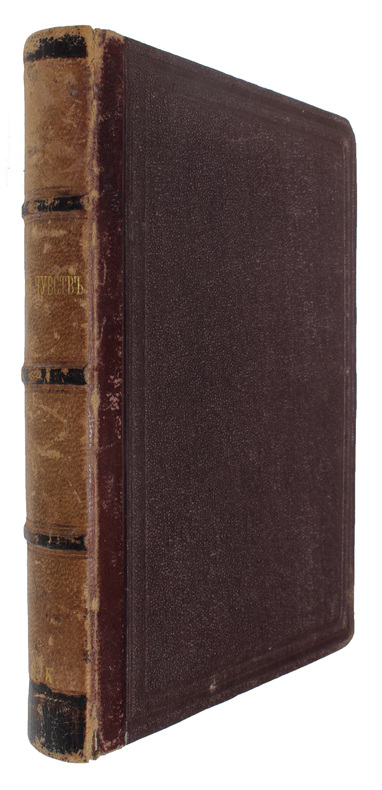
|
|
|
"SMITH, ADAM.
Undersøgelse om National-Velstands Natur og Aarsag. Af det Engelske oversat og med nogle Anmærkninger oplyst af Dræbye. 2 Deele. [Anden Deel:] Hertil er føiet Gourvenør Pownals Brev til Forfatteren i hvilket nogle af de i dette Værk fremsatte Læresætn... - [FIRST DANISH EDITION OF ""THE WEALTH OF NATIONS""]
Kiøbenhavn [Copenhagen], 1779-80. 8vo. Two very nice contemporary brown half calf bindings with raised bands, gilt ornamentations and gilt leather title- and tome-labels. Volume two with a bit of wear to upper capital. Corners slightly bumped. Pencil annotations to verso of title-page in volume one" title-page in volume two mounted to cover up a small hole caused by the removal of an old owner's name. Internally very clean and bright. All in all a very nice, clean, fresh, and tight copy. Engraved (by Weise, 1784) armorial book plate to inside of front boards (Gregorius Christianus Comes ab Haxthausen). (12), 575" (8), 775, (3, - errata) pp.
Referentie van de boekhandelaar : 47455
|
|
|
"SMITH, ADAM.
Undersøgelse om National-Velstands Natur og Aarsag. Af det Engelske oversat og med nogle Anmærkninger oplyst af Dræbye. 2 Deele. [Anden Deel:] Hertil er føiet Gourvenør Pownals Brev til Forfatteren i hvilket nogle af de i dette Værk fremsatte Læresætn... - [FIRST DANISH EDITION OF ""THE WEALTH OF NATIONS""]
Kiøbenhavn [Copenhagen], 1779-80. 8vo. Two nice contemporary half calf bindings with four raised bands and gilt leather title label to spines. Volume one lacking one cm of upper part of spine. Volume two with a small tear to lower part of spine. Both volumes with light brown spotting throughout, however, mainly affecting first and last five leaves of both volumes. A fine set. (12), 575"" (8), 775, (3, - errata) pp.
Referentie van de boekhandelaar : 50523
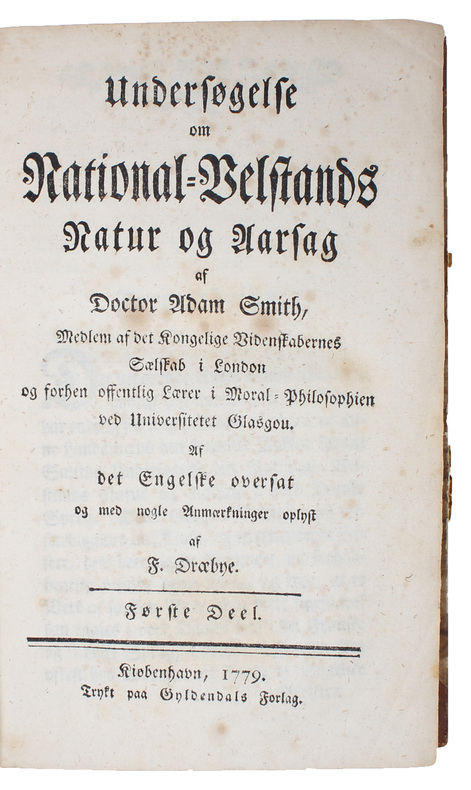
|
|
|
"SMITH, ADAM.
Untersuchung der Natur und Ursachen von Nationalreichthümern, Aus dem Englischen. 2 Bände. - [THE SEMINAL FIRST TRANSLATION OF 'WEALTH OF NATIONS']
Leipzig, Weidmann, 1776-78. 8vo. Bound in two nice uniform contemporary half calf bindings with five raised bands and gilt lettering to spine. Ex-libris pasted on to pasted down front free end-papers and a small embossed stamp to front free end paper on volume 1 (""Buchhändler u. Antiquar Carl Helf""). Stamp to p. 1 of both volumes. Spines with light soiling and capital on volume 1 lacking a small part of the leather. A few light brown spots throught. A fine set. VIII, 632 pp"" XII, 740 pp.
Referentie van de boekhandelaar : 48982
|
|
|
"SMITH, ADAM -
""Om Beskatning"" (+) ""Om Jordbrukets förfall i Europa, efter Romerska Väldets undergäng"" (+) ""Om Handelsbalancen"" (+) ""Om Jordbruks-systemet I en Rikshushållning, samt om Economisterne I Frankrike"" (+) ""Om Pappers-myntet I Norr-Amerika Kolonierne, före... - [""THE EARLIEST APPEARANCE IN SWEDISH OF A NUMBER OF TRANSLATIONS FROM ADAM SMITH""]
Stockholm, Henrik A. Nordström, 1797-1801. 8vo. Uncut, partly unopened in the original wrappers. In 22 volumes as issued. Last volume name written on title-page, otherwise an exceptionally fine, clean and untouched set rarely seen in this condition. (4),102 pp." (2),182 pp. (2),107 pp. (2),157,(1) pp. (2),176,(4) pp. (4),138,(2) pp. (2),205,(1) pp. + 1 folded table (2),188 pp (2),190 pp. (2),89,(4) pp. (4),135,(1) pp. (2),116,(1) pp. (2),157 pp. (2),120 pp. (2),151,(1 blank,10) pp. + 1 folded map (2),215 pp. + 1 folded table (2),131,(5) pp. (4),207 pp. (2),183,(1) pp. + 1 folded table (2),218 pp. (2),144,(4) pp. " (6),449,(1) pp. + 5 folded plates.""Om Beskatning"", Part: 36, 37, 38:Pp. 145-177""Om Jordbrukets förfall i Europa, efter Romerska Väldets undergäng"", Part: 27, 28. Pp. 93-120""Om Handelsbalancen"", Part: 25,26. Pp. 92-114""Om Jordbruks-systemet I en Rikshushållning, samt om Economisterne I Frankrike"", Part: 25-26. Pp. 43-92""Om Pappers-myntet I Norr-Amerika Kolonierne, före Revolutionen"". Part: 27-28. Pp.57-62""Om Krono-jord"". Part: 29,30,31. Pp 139-146.""Theorien för statsskulder"". Part: 44, 45, 46, 47, 48, 49 & 50. Pp. 151-161.
|
|
|
"SMITH, ADAM.
En Undersökning av Folkens Välstånd dess Natur och Orsaker. Översättning av D:r Emil Sommarin. 2 volumes. - [FIRST SWEDISH EDITION OF ""THE WEALTH OF NATIONS""]
Lund, C. W. K. Gleerups förlag, 1909 & 1911. 8vo. Bound with the original wrappers of volume 1 in one contemporary half blue cloth binding with red leather titel label with gilt lettering to spine. A fine and clean copy. XVI,191, (4), 179 pp.

|
|
|
"SMITH, ADAM.
En Undersökning av Folkens Välstånd dess Natur och Orsaker. Översättning av D:r Emil Sommarin. [i.e. Swedish ""Wealth of Nations""]. 2 volumes. - [FIRST SWEDISH EDITION OF ""THE WEALTH OF NATIONS""]
Lund, C. W. K. Gleerups förlag, 1909 & 1911. 8vo. Both volumes in the original printed wrappers. Light wear to spines, otherwise a very fine and clean set. XVI,191, (4), 179 pp.
|
|
|
"SMITH, ADAM.
Milletlerin Zenginligi. [i.e. ""Wealth of Nations""] 4 vols. - [FIRST TURKISH TRANSLATION OF 'WEALTH OF NATIONS']
Istanbul, Milli Egitim Basimevi, 1948 [Vol. 1 & 2] & 1955 [Vol. 3 & 4]. 8vo. 4 volumes in the original printed wrapper. Spines (especially on vol. 1 and 4) with wear and a bit of miscolouring, otherwise a fine and clean set. IV, 393, (8)" (6), 340 386 " 415, (2) pp.
|
|
|
"SMITH, ADAM.
Politisk undersökning om lagar, som hindra och tvinga införseln af sådana utländska varor, som kunna alstras eller tillverkas inom landet. Göteborg. (i.e. English: ""An Inquiry into the Nature and Causes of the Wealth of Nations""). - [SWEDISH TRANSLATION OF ADAM SMITH'S WEALTH OF NATIONS]
Göteborg (S. Norberg) 1804. 8vo. In contemporary grey blank wrappers. Stamp to front wrapper, verso of front wrapper, title-page and p. 17. Otherwise fine. (12), (1)-51, (1) pp.
|
|
|
"SMITH, ADAM.
Teoriia nravstvennykh chuvstv [...] S pis'mami M. Kondorse k Kabanisu o simpatii. [i.e. Russian ""Theory of Moral Sentiments""]. - [FIRST RUSSIAN TRANSLATION OF ""THE THEORY OF MORAL SENTIMENTS""]
St Petersburg, I. I. Glazunov, 1868. 8vo. In contemporary half calf with with embossed boards. Three raised bands and gilt lettering to spine. Spine with wear. Small label pasted on to top left corner of pasted down front free end-paper. Removed stamp to half-title and title-page with stamp and a a few number written to top of title-page. A few light occassional underlining in pencil, otherwise internally fine and clean. (1)-515, (1), IV pp.
|
|
|
"SMITH, ADAM.
Undersøgelse om National-Velstands Natur og Aarsag. Af det Engelske oversat og med nogle Anmærkninger oplyst af Dræbye. 2 Deele. [Anden Deel:] Hertil er føiet Gourvenør Pownals Brev til Forfatteren i hvilket nogle af de i dette Værk fremsatte Læresætn... - [FIRST DANISH EDITION OF ""THE WEALTH OF NATIONS""]
Kiøbenhavn [Copenhagen], 1779-80. 8vo. Two very nice contemporary brown half calf bindings with raised bands, gilt ornamentations and gilt leather title- and tome-labels. Volume two with a bit of wear to upper capital. Corners slightly bumped. Pencil annotations to verso of title-page in volume one" title-page in volume two mounted to cover up a small hole caused by the removal of an old owner's name. Internally very clean and bright. All in all a very nice, clean, fresh, and tight copy. Engraved (by Weise, 1784) armorial book plate to inside of front boards (Gregorius Christianus Comes ab Haxthausen). (12), 575 " (8), 775, (3, - errata) pp.
|
|
|
"SMITH, ADAM.
Undersøgelse om National-Velstands Natur og Aarsag. Af det Engelske oversat og med nogle Anmærkninger oplyst af Dræbye. 2 Deele. [Anden Deel:] Hertil er føiet Gourvenør Pownals Brev til Forfatteren i hvilket nogle af de i dette Værk fremsatte Læresætn... - [FIRST DANISH EDITION OF ""THE WEALTH OF NATIONS""]
Kiøbenhavn [Copenhagen], 1779-80. 8vo. Two nice contemporary half calf bindings with four raised bands and gilt leather title label to spines. Volume one lacking one cm of upper part of spine. Volume two with a small tear to lower part of spine. Both volumes with light brown spotting throughout, however, mainly affecting first and last five leaves of both volumes. A fine set. (12), 575" " (8), 775, (3, - errata) pp.
|
|
|
"SMITH, ADAM.
Untersuchung der Natur und Ursachen von Nationalreichthümern, Aus dem Englischen. 2 Bände. - [THE SEMINAL FIRST TRANSLATION OF 'WEALTH OF NATIONS']
Leipzig, Weidmann, 1776-78. 8vo. Bound in two nice uniform contemporary half calf bindings with five raised bands and gilt lettering to spine. Ex-libris pasted on to pasted down front free end-papers and a small embossed stamp to front free end paper on volume 1 (""Buchhändler u. Antiquar Carl Helf""). Stamp to p. 1 of both volumes. Spines with light soiling and capital on volume 1 lacking a small part of the leather. A few light brown spots throught. A fine set. VIII, 632 pp" " XII, 740 pp.
|
|
|
"SOETBEER, ADOLF.
Edelmetall-Produktion und Wertverhältniss zwischen Gold und Silber seit der Entdeckung Amerika's bis zur gegenwart. Mit drei Tafeln graphischer Darstellungen.
Gotha, Julius Perthes, 1879. 4to. No wrappers. ((4),142 pp. and 3 large folded plates.
Referentie van de boekhandelaar : 46764
|
|
|
"SOETBEER, ADOLF.
Edelmetall-Produktion und Wertverhältniss zwischen Gold und Silber seit der Entdeckung Amerika's bis zur gegenwart. Mit drei Tafeln graphischer Darstellungen.
Gotha, Julius Perthes, 1879. 4to. No wrappers. ((4),142 pp. and 3 large folded plates.
|
|
|
"STRACCHA, BENUENUTI. [BENVENUTO STRACCA].
De mercatura, seu Mercatore tractatus. - [INTRODUCING MARITIME AND COMMERCIAL LAW]
Venetiis [Venice], Cum Preivilegio [Paolo Manuzio], 1553. 8vo. In a contemporary unrestored vellum binding with three raised bands. Later paper labels pasted on to upper and lower part of spine. ""Stracc. / de /Mercat."" written in contemporary hand to spine. Upper and lower part of front hinge slightly cracked. ""sum Marii D'Abbatis"" written in contemporary hand to pasted down front free end-paper. Early oval stamp on verso of title-page with monogram. Aldine woodcut device to title-page (Ahmanson-Murphy device no: B2). Occasional marginal annotations and very light occasional marginal water-staining. Tiny wormhole in blank outer margin not affecting text. A very nice, clean, and completely unrestored copy. (40), 287, (1) ff. (with the four blanks 5+6-8 and 2N8). As usual with the typopgraphical errors: ""63 '64', 85 '87', 87 '85', 102 '106', 165 '167', 174 '176', 176 '178'"". These errors are to be found in all published copies.
Referentie van de boekhandelaar : 50627

|
|
|
"STIGLITZ, J. E. (+) A. K. DIXIT.
Monopolistic Competition and Optimum Product Diversity - [""TRANSFORMED INTERNATIONAL TRADE THEORY"" - THE DIXIT-STIGLITZ MODEL]
Nashville, American Economic Association, 1977. Lex8vo. In the original printed wrappers. In ""The American Economic Review, June 1977"". Entire issue offered. A very fine and clean copy. Pp. 297-308. [Entire volume: Pp. (4), 261-535, (25)].
Referentie van de boekhandelaar : 46502
|
|
|
"STIGLITZ, J. E. (+) A. K. DIXIT.
Monopolistic Competition and Optimum Product Diversity - [""TRANSFORMED INTERNATIONAL TRADE THEORY"" - THE DIXIT-STIGLITZ MODEL]
Nashville, American Economic Association, 1977. Lex8vo. In the original printed wrappers. In ""The American Economic Review, June 1977"". Entire issue offered. A very fine and clean copy. Pp. 297-308. [Entire volume: Pp. (4), 261-535, (25)].
|
|
|
"STRACCHA, BENUENUTI. [BENVENUTO STRACCA].
De mercatura, seu Mercatore tractatus. - [INTRODUCING MARITIME AND COMMERCIAL LAW]
Venetiis [Venice], Cum Preivilegio [Paolo Manuzio], 1553. 8vo. In a contemporary unrestored vellum binding with three raised bands. Later paper labels pasted on to upper and lower part of spine. ""Stracc. / de /Mercat."" written in contemporary hand to spine. Upper and lower part of front hinge slightly cracked. ""sum Marii D'Abbatis"" written in contemporary hand to pasted down front free end-paper. Early oval stamp on verso of title-page with monogram. Aldine woodcut device to title-page (Ahmanson-Murphy device no: B2). Occasional marginal annotations and very light occasional marginal water-staining. Tiny wormhole in blank outer margin not affecting text. A very nice, clean, and completely unrestored copy. (40), 287, (1) ff. (with the four blanks 5+6-8 and 2N8). As usual with the typopgraphical errors: ""63 '64', 85 '87', 87 '85', 102 '106', 165 '167', 174 '176', 176 '178'"". These errors are to be found in all published copies.
|
|
|
"TETENS, J.N. (JOHANN NICOLAI).
Efterretning om Tilstanden af den almindelige Enke=Kasse i Kjøbenhavn ved Slutningen af Aaret 1797, samt almindelige Anmærkninger over Forsikrings=Anstalter i Livs= og Døds= Tilfælde i Almindelighed. Oversat af N. Søndergaard.
Kiøbenhavn, C.G. Prost/ B.K. Horrebow, 1802. Lille 8vo. Smukt samtidigt helldrbd. med rig rygforgyldning, forgyldte borter på permer (gevebindsudstyr). 125,(1) pp. samt 3 store foldetabeller. ren og frisk, trykt på skrivepapir.
Referentie van de boekhandelaar : 47484
|
|
|
"TETENS, J.N. (JOHANN NICOLAI).
Efterretning om Tilstanden af den almindelige Enke=Kasse i Kjøbenhavn ved Slutningen af Aaret 1797, samt almindelige Anmærkninger over Forsikrings=Anstalter i Livs= og Døds= Tilfælde i Almindelighed. Oversat af N. Søndergaard.
Kiøbenhavn, C.G. Prost/ B.K. Horrebow, 1802. Lille 8vo. Smukt samtidigt helldrbd. med rig rygforgyldning, forgyldte borter på permer (gevebindsudstyr). 125,(1) pp. samt 3 store foldetabeller. ren og frisk, trykt på skrivepapir.
|
|
|
"TOBIN, JAMES.
Estimation of Relationships for Limited Dependent Variables. - [FIRST PUBLICATION OF THE TOBIT MODEL]
(Chicago, The Econometric Society. 1958). Large8vo. Bound without wrappers in light green full cloth with gilt lettering to spine. In ""Econometrica, Journal of the Econometric Society, Volume 26, 1958"". Library label pasted on to pasted down front free end-paper and library stamp to front free end-paper. Frontispiece of Wassily Leontief (President of the Econometric Society, 1954). Minor miscolouring to title page, otherwise a fine and clean copy. [Tobin:] Pp. 24-36. [Entire issue: VIII, 641 pp. + 1 page of advertising + frontispiece).
Referentie van de boekhandelaar : 44995
|
|
|
"TOBIN, JAMES.
The New Economics One Decade Older. - [TOBIN-TAX]
Princeton, Princeton University Press, 1974. 8vo. In publisher's original full cloth with gilt lettering to spine in the original (price-clipped) dust-jacket. Vague stamp (""$5.45"") to half title. A very fine and clean copy. (10), 105, (1) pp.
Referentie van de boekhandelaar : 53281
|
|
|
"TOBIN, JAMES.
Estimation of Relationships for Limited Dependent Variables. - [FIRST PUBLICATION OF THE TOBIT MODEL]
(Chicago, The Econometric Society. 1958). Large8vo. Bound without wrappers in light green full cloth with gilt lettering to spine. In ""Econometrica, Journal of the Econometric Society, Volume 26, 1958"". Library label pasted on to pasted down front free end-paper and library stamp to front free end-paper. Frontispiece of Wassily Leontief (President of the Econometric Society, 1954). Minor miscolouring to title page, otherwise a fine and clean copy. [Tobin:] Pp. 24-36. [Entire issue: VIII, 641 pp. + 1 page of advertising + frontispiece).
|
|
|
"TOBIN, JAMES.
The New Economics One Decade Older. - [TOBIN-TAX]
Princeton, Princeton University Press, 1974. 8vo. In publisher's original full cloth with gilt lettering to spine in the original (price-clipped) dust-jacket. Vague stamp (""$5.45"") to half title. A very fine and clean copy. (10), 105, (1) pp.
|
|
|
"TURNER, THOMAS.
An Epitome of Book-Keeping by Double Entry: Delineated on a Scale Suited to the Faculties and Comprehension of Senior School Boys and Youth, Designed for the Mercantile Line, Comprising Systematic and Unerring Rules for the Forming Monthly Statements ... - [ONE OF THE EARLIEST WORK ON BOOKKEEPING PRINTED IN AMERICA]
Portland, Jenks & Shirley, 1804. 8vo. In contemporary full calf with gilt lettering to spine. Extremities with wear and hindges a bit weak. Previous owners names to front free end-paper. Title-page missing missing lower outer corner, not affecting text. Internally with light occassional brownspotting. (2 blank leaves), 148, (2), (3 blank leaves) pp.
Referentie van de boekhandelaar : 58459

|
|
|
"TURNER, THOMAS.
An Epitome of Book-Keeping by Double Entry: Delineated on a Scale Suited to the Faculties and Comprehension of Senior School Boys and Youth, Designed for the Mercantile Line, Comprising Systematic and Unerring Rules for the Forming Monthly Statements ... - [ONE OF THE EARLIEST WORK ON BOOKKEEPING PRINTED IN AMERICA]
Portland, Jenks & Shirley, 1804. 8vo. In contemporary full calf with gilt lettering to spine. Extremities with wear, upper and lower part of spine missing and back board partly detached. Previous owner's name to front free end-paper. Internally with occassional soiling. (2 blank leaves), 148, (2), (3 blank leaves) pp.
Referentie van de boekhandelaar : 59867

|
|
|
"TURNER, THOMAS.
An Epitome of Book-Keeping by Double Entry: Delineated on a Scale Suited to the Faculties and Comprehension of Senior School Boys and Youth, Designed for the Mercantile Line, Comprising Systematic and Unerring Rules for the Forming Monthly Statements ... - [ONE OF THE EARLIEST WORK ON BOOKKEEPING PRINTED IN AMERICA]
Portland, Jenks & Shirley, 1804. 8vo. In contemporary full calf with gilt lettering to spine. Extremities with wear and hindges a bit weak. Previous owners names to front free end-paper. Title-page missing missing lower outer corner, not affecting text. Internally with light occassional brownspotting. (2 blank leaves), 148, (2), (3 blank leaves) pp.
|
|
|
"TURNER, THOMAS.
An Epitome of Book-Keeping by Double Entry: Delineated on a Scale Suited to the Faculties and Comprehension of Senior School Boys and Youth, Designed for the Mercantile Line, Comprising Systematic and Unerring Rules for the Forming Monthly Statements ... - [ONE OF THE EARLIEST WORK ON BOOKKEEPING PRINTED IN AMERICA]
Portland, Jenks & Shirley, 1804. 8vo. In contemporary full calf with gilt lettering to spine. Extremities with wear, upper and lower part of spine missing and back board partly detached. Previous owner's name to front free end-paper. Internally with occassional soiling. (2 blank leaves), 148, (2), (3 blank leaves) pp.
|
|
|
"V.V. [VASILY VORONTSOV].
Sud'by kapitalizma v Rossii. [i.e.: The fate of capitalism in Russia]. - [THE EPITOME OF NARODNIK ECONOMICS AND THE FIRST SERIOUS ATTEMPT AT ANALYZING RUSSIAN CAPITALISM]
S.-Peterburg, Typografiya M.M. Ctasiulevitsa, 1882. 8vo. Bound in an elegant recent red half calf binding, in pastiche, with five raised bands and gilt lettering to spine. Heavily underlined thoughout in blue and red. Title-page repaired at inner hinge, far from affecting text. No stamps. (4), 312 pp.
Referentie van de boekhandelaar : 48766

|
|
|
"V.V. [VASILY VORONTSOV].
Sud'by kapitalizma v Rossii. [i.e.: The fate of capitalism in Russia]. - [THE EPITOME OF NARODNIK ECONOMICS AND THE FIRST SERIOUS ATTEMPT AT ANALYZING RUSSIAN CAPITALISM]
S.-Peterburg, Typografiya M.M. Ctasiulevitsa, 1882. 8vo. Bound in an elegant recent red half calf binding, in pastiche, with five raised bands and gilt lettering to spine. Heavily underlined thoughout in blue and red. Title-page repaired at inner hinge, far from affecting text. No stamps. (4), 312 pp.
|
|
|
"VAUBAN, SEBASTIEN LE PRESTRE.
Projet d'une dixme royale. Qui supprimant la taille, Les Aydes, les Doüanes d'une Province à l'autre (...). - [""UNSURPASSED, BEFORE OR AFTER""]
(No place, nor printer), 1707. 8vo. In contemporary full calf with five raised bands and richly gilt spine. Edges of boards gilt. Title-label is either missing or have never been added. Small paper-label pasted on to top of spine. Stains and scratches to boards. Corners bumped. Internally nice and clean. VIII, 268 pp. + 3 folded tables.
Referentie van de boekhandelaar : 60967

|
|
|
"VEBLEN, THORSTEIN.
On the Nature of Capital (+) On the Nature of Capital: Investment, Intangible Assets, and the Pecuniary Magnate.
(Boston, Stanford University Press), 1908. 8vo. Two offprints in the original printed wrappers. Offprints from ""Quarterly Journal of Economics"", Vol. XXII, August & Vol. XXIII, November 1908. Vol. XXII: Backwrapper detached, a few small nicks to extremities. Vol. XXIII: Front wrapper detached. Fine and clean. Pp. 517-42"" Pp. 103-136.
Referentie van de boekhandelaar : 48625

|
|
|
"VEBLEN, THORSTEIN.
On the Nature of Capital (+) On the Nature of Capital: Investment, Intangible Assets, and the Pecuniary Magnate.
(Boston, Stanford University Press), 1908. 8vo. Two offprints in the original printed wrappers. Offprints from ""Quarterly Journal of Economics"", Vol. XXII, August & Vol. XXIII, November 1908. Vol. XXII: Backwrapper detached, a few small nicks to extremities. Vol. XXIII: Front wrapper detached. Fine and clean. Pp. 517-42" " Pp. 103-136.
|
|
|
"WHATELY, THOMAS.
Considerations on the Trade and Finances of this Kingdom and on the Measures of Administration with Respect to those great National Objects since the Conclusion of the Peace. - [""IMPORTANT AND EXTREMELY RARE"" WORK ON BRITISH TRADE AND FINANCE]
London, J. Wilkie, 1766. 4to. In the original printed wrappers. Lacking backstrip and with a small stain to back wrapper, otherwise a very fine and clean copy. 119 pp.
Referentie van de boekhandelaar : 50411

|
|
|
"WHATELY, THOMAS.
Considerations on the Trade and Finances of this Kingdom and on the Measures of Administration with Respect to those great National Objects since the Conclusion of the Peace. - [""IMPORTANT AND EXTREMELY RARE"" WORK ON BRITISH TRADE AND FINANCE]
London, J. Wilkie, 1766. 4to. In the original printed wrappers. Lacking backstrip and with a small stain to back wrapper, otherwise a very fine and clean copy. 119 pp.
|
|
|
"WICKSELL, KNUT.
Allianser mellan Arbetare och Arbetsgifvare. En ny företeelse på det socialpolitiska området. [Studenterföreningen Verdandis Småskrifter. 109.].
Stockholm, (1902). 8vo. Original printed orange wrappers. Wrappers fully intact but loosened from book block. Internally very fresh and clean. Uncut. 30 pp.
Referentie van de boekhandelaar : 42272
|
|
|
"WIESER, FRIEDRICH VON.
Der Natürliche Werth. - [THE FIRST FULLY DEVELOPED THEORY OF VALUE - COINING ""IMPUTATION""]
Wien, Alfred Hölder, 1889. 8vo. Uncut in the original printed yellow wrappers. Light soiling and a few minor nicks to extremities. A very fine and clean copy. XVI, 239 pp.
Referentie van de boekhandelaar : 50373

|
|
|